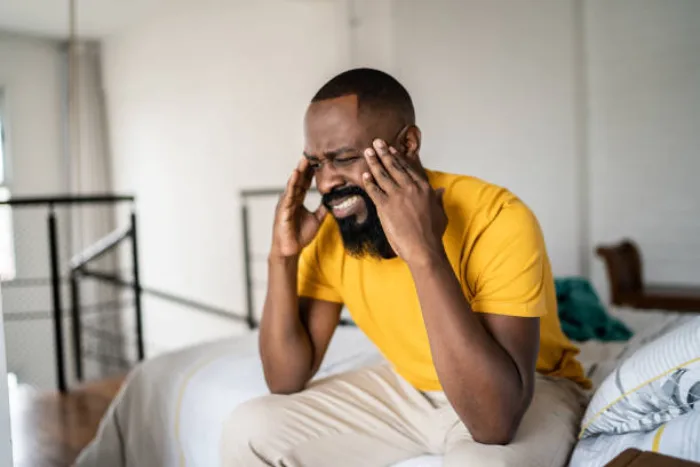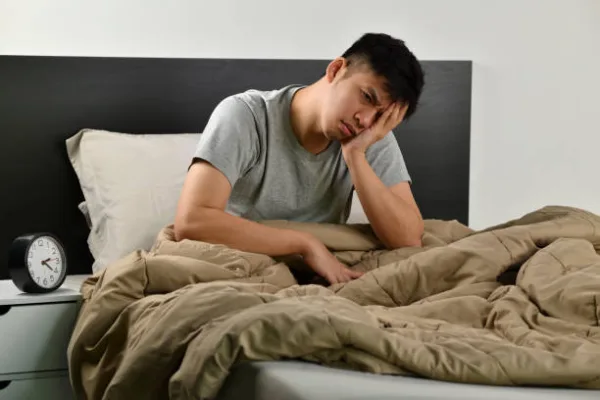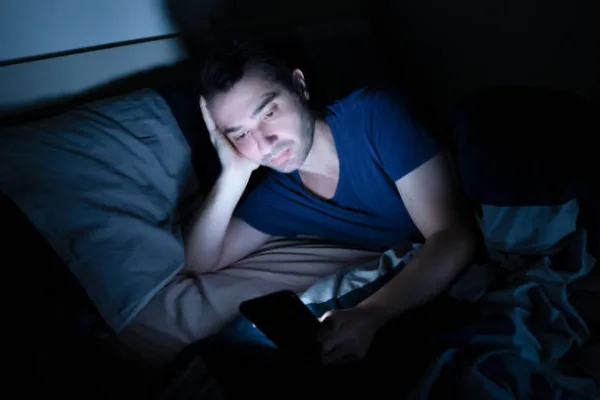Do you wake up exhausted, even after spending several hours in bed? If so, you may be experiencing sleep anxiety or insomnia. While these two conditions are often used interchangeably, they have distinct differences that can affect how they are treated.
Sleep anxiety is an anxiety disorder that affects your ability to fall and stay asleep. It is characterized by excessive worry and fears about the quality of your sleep. This can lead to physical symptoms such as sweating, rapid heartbeat, and muscle tension.
Alternatively, insomnia is a sleep disorder that involves difficulty falling or staying asleep without any specific cause. It can be caused by underlying medical conditions, medications, substance abuse or withdrawal, or mental health disorders such as depression or anxiety.
Understanding the differences between these two conditions is crucial for finding the right treatment plan that works for you. So let’s look closer at the symptoms, causes, and treatments for sleep anxiety and insomnia.
Here Are the Differences Between Sleep Anxiety and Insomnia
There are some similarities between the two conditions, but they differ greatly in their definitions, emotional state, causes, symptoms, and triggers. Here are the main differences between sleep anxiety and insomnia:
- No 01: Definition
- No 02: Emotional State
- No 03: Causes
- No 04: Sleep Quality
- No 05: Symptoms
- No 06: Triggers
- No 07: Treatment Approach
No 01: Definition
Sleep anxiety refers to the stress or fear of not being able to fall asleep or stay asleep. On the other hand, insomnia is characterized by difficulty falling asleep, trouble staying asleep, waking up too early, or waking up feeling tired.
Essentially, sleep anxiety is a psychological condition that stems from worrying about sleeping problems. In contrast, insomnia actually causes actual sleeping problems.
No 02: Emotional State
Negative thoughts and fears related to sleep are primarily responsible for sleep anxiety. Accordingly, people who experience sleep anxiety may be fearful of nightmares, sleepwalking, or bedwetting.
They may also worry that they will not have a good night’s sleep, leading to a negative spiral of anxiety, worry, and poor sleep.
Meanwhile, insomnia is characterized by difficulty initiating or maintaining sleep, independent of the emotional state. This means that people with insomnia may have trouble falling or staying asleep, even when not feeling anxious or worried.
No 03: Causes
You can identify and address sleep disturbances by understanding the various causes.
Medical conditions such as chronic pain or respiratory disorders can trigger insomnia, as can medications that interfere with sleep. Lifestyle factors like irregular sleep schedules or caffeine consumption can also cause insomnia. Mental health disorders such as anxiety or depression can also contribute to insomnia.
Contrary to this, sleep anxiety can result from excessive worrying about sleep and lead to difficulty falling or staying asleep.
No 04: Sleep Quality
Another difference between sleep anxiety and insomnia is their impact on sleep quality. Sleep anxiety typically results in a perception of poor sleep quality due to preoccupation with sleep-related worries.
People with sleep anxiety may feel like they are not getting enough restful sleep, even if they are actually sleeping for a normal amount of time.
Conversely, insomnia directly affects the ability to achieve restful and sufficient sleep, leading to actual sleep disturbances. And individuals suffering from insomnia might have trouble sleeping, staying asleep, or getting enough sleep to feel rested and alert during the day.
No 05: Symptoms
Feeling overwhelmed, having difficulty concentrating, and experiencing digestive problems are just a few symptoms of sleep anxiety. Individuals with sleep anxiety may also experience irritability and restlessness.
The converse is true, insomnia symptoms include difficulty falling asleep, frequent awakenings throughout the night, and early morning awakening. Fatigue during the day and impaired daytime functioning also indicate insomnia.
No 06: Triggers
Specific sleep-related concerns, such as fear of nightmares, sleepwalking, or bedwetting, often trigger sleep anxiety. Thus, people with sleep anxiety may have specific triggers that cause them to worry about sleep.
As opposed to this, insomnia is influenced by a range of factors, including stress, medical conditions, environmental factors, or medication. Consequently, insomniacs may find that a noisy environment, physical discomfort, or a new routine keeps them awake.
No 07: Treatment Approach
Sleep-related problems are effectively treated with personalized plans developed by therapists. Cognitive behavioral therapy (CBT), a common approach, addresses underlying anxiety that contributes to sleep anxiety.
At the same time, CBT for insomnia (CBT-I) focuses on improving sleep habits and addressing factors that lead to insomnia. The goal of treatment for sleep anxiety is to reduce anxiety and worry about sleep, allowing for a more peaceful and restful experience.
On the other hand, insomnia primarily concentrates on improving sleep quality and duration. Also, addressing the underlying factors that cause sleep disturbance such as medical conditions, stress, or other issues.
Seeking professional help for sleep difficulties at an early stage can lead to better outcomes and improved quality of life.
Therapy sessions modify sleep-related thoughts and behaviors, teach relaxation techniques, and provide stress reduction strategies for patients. With the help of therapists, people can sleep more easily and with less disruption.
What can you do to get rid of sleep anxiety and insomnia?
Sleep anxiety and insomnia are manageable by maintaining a consistent sleep schedule and avoiding caffeine and daytime naps. Incorporating exercise into your daily routine is beneficial, but do it early enough so your body has time to wind down before bedtime.
Creating an environment that is cool, dark, and conducive to sleep is also crucial. Remember to limit activities in bed to sleeping and intimacy to help your body recognize that it’s time to sleep.
If these methods don’t work well enough, medication may be needed. One option is Codeine Phosphate 30 mg, which reduces anxiety and stress caused by pain. You can buy Codeine Phosphate 30 mg from reputable online pharmacies or physical stores.
How do I know if my insomnia is from anxiety?
If you’re struggling to fall asleep, waking up frequently at night, or feeling tired and irritable during the day, anxiety may be causing your insomnia.
Anxiety-induced insomnia can manifest as difficulty falling asleep due to racing thoughts or an inability to relax. You may experience sleep deprivation, dread, or panic during the night.
Consider relaxation techniques and cognitive behavioral therapy if you suspect your insomnia is triggered by anxiety.
Discover the Root Cause of Your Sleep Troubles: Is it Anxiety or Insomnia?
Identifying whether your sleep difficulties come from anxiety or insomnia is crucial in addressing the root cause and finding appropriate remedies.
When dealing with sleep anxiety, methods such as meditation and deep breathing exercises can help relax your mind and prepare for rest. Similarly, establishing a consistent bedtime routine can signal to your body it’s time for sleep.
In contrast, those with insomnia symptoms through anxiety disorders may require mental health assistance, including treatment such as therapy or medication.
Ultimately, acknowledging the differences between sleep anxiety and insomnia is vital. In this way, you can establish efficient solutions to improve sleep quality, overall wellness and more restful sleep.



